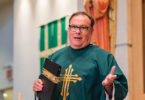
by Michael Podrebarac
Lent is soon upon us. There was a time in the church when it was treated as a final “home stretch” period of purification for the catechumens preparing to enter the church at Easter.
Then it was decided it would serve equally well for those “public penitents” (yes, they had those back then) who were returning to the Eucharist at Easter.
Then the church wisely figured that each of us is a bit of a public penitent and perhaps should dial up our own penitential practices in preparation for renewing our baptismal promises on Easter Sunday.
Back then, however, both penitents and the faithful offered their confession just before or right at the beginning of Lent, and their Lenten penance was their confessional penance.
Around that time, a decreasing number of folks were receiving holy Communion at Mass on Sunday. Why?
They were afraid that they were too sinful and unworthy to receive, and who wants to take a chance on receiving Communion unworthily?
The situation got so dire that in 1215, the Fourth Lateran Council mandated that the faithful must receive holy Communion at least once each year, during Eastertide. Hence, entered the so-called Easter duty. And what was expected before receiving holy Communion? You guessed it — confession (also now required at least once each year).
Lent then turned a bit upside down. Shrove Tuesday became one last binge before the great fast. Lent became known as a season of penance “just because” and every parish priest knew that, through the very last days of Lent, he’d be spending extra time in the confessional.
Don’t get me wrong. Lent still works just fine. But what if, this year, some of us began to keep Lent in its original character? What if, sometime during the next couple of weeks, we prayerfully examined ourselves, considered our need for some old-school penance, received the sacrament of reconciliation and then thankfully and resolutely offered our penance for the holy season? I think that’s what I myself will try to do this year.
Then, my penance — an opportunity to strengthen my conversion — might take on added meaning. It could serve as a grateful response for the gift of absolution, the gift of being unshackled from the weight and burden of my sin. Having spent six weeks performing my penance, steeped in the traditions of prayer, fasting, and works of charity, with what greater conviction might I vow to reject Satan and profess Christ and his church on Easter Sunday?
Just a thought, something perhaps to consider. The important thing is that each one of us offer some meaningful self-denial and to hit the confessional, in whatever order seems best suited to our holy aspirations and spiritual needs.






